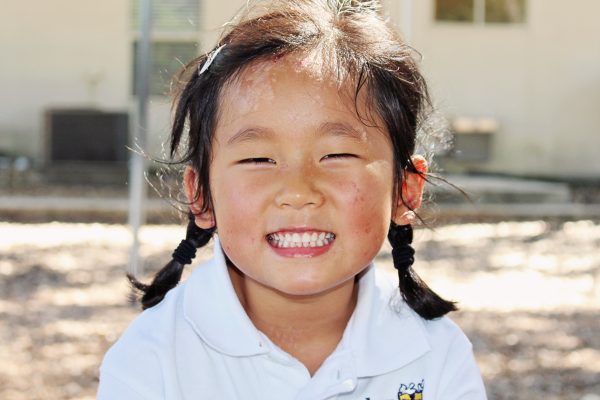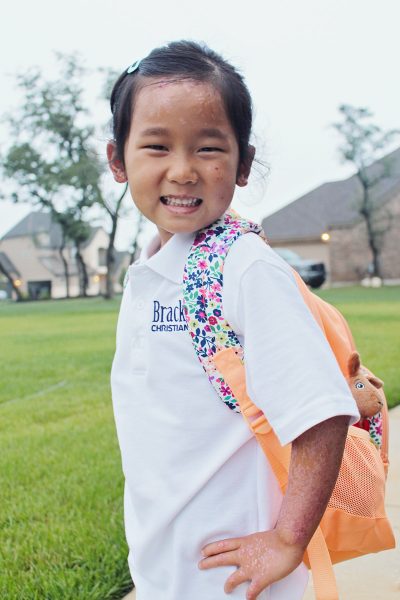………
There was once a mama desperate to make it to the other side of the world to see her daughter face-to-face… and though the thrill of the moment could never be eclipsed, she eventually stopped looking at the moon, and forgot the stars existed.
Reality was hard, and the moon seemed so distant. So… unattainable.
Aiming for things closer to earth seemed much more wise. Much… safer.
That mama was me. I was the earthbound one, I was the one who stopped dreaming the big dreams because, quite frankly, they scared me. The what-ifs of an unknown future were too much to think about, and so I didn’t go there.
One of my many big dreams involved our new daughter being able to attend the same private school we loved having our older three children attend. The bigness of this dream scared me because, as a private school, this place we love doesn’t have the same mandate to protect children with special needs as a public school, and with so many unknowns still to be discovered about our girl, I was worried.
What if it just didn’t work?
Before we started the year, there were many questions we needed answers to. Though we knew we wanted her to be able to attend this school, we also knew that we wanted to the school to feel comfortable caring for her with the extra needs she has. We were honest about our questions, and they were honest in their assessments.

If you are considering a private school education for your child with extra needs, here are just a few of the questions we asked ourselves and the school before we took the step to enroll her. These questions might help you, too, if you’re considering education for your child outside of the public school or homeschool arenas.
1. Academic Capability
Let’s face it. Many private schools have academic standards that are extraordinarily high. Children who are not perceived as “college prep” are, at times, not as likely to be welcomed in these settings. In our case, we knew our daughter was still making up for lost time, and was not yet at the same academic level as her age group. Rather than push her to be in the grade she matched up with age-wise, we pursued the grade for the age is matched up with, maturity-wise. We instead had her tested for the year below her age level (she is 5 and a half, we tested for PreK 4).
The test showed her weakest area to be communication. This came as no surprise to me, as I had already started the ball rolling on speech therapy sessions to begin over the summer. The test also showed how far she has advanced in just 20 months! I was astounded to see the things she could do, things she couldn’t have dreamed of doing two years prior. She is still behind the curve with knowledge related to experiences, but this is something she is catching up to in leaps and bounds. She is a sponge, and learning so much every day.
If you are considering private schools, know that while many will accommodate mild needs for extra help, some will not. Don’t feel hurt about this. Even if the school is open to having your child attend, they may not be able to accommodate purely based on staffing issues.
Private schools simply cannot add staff just because a new child enrolls in the way public schools can. The budget process is vastly different. If your child requires a more involved accommodation such as having a full-time aide, it may not be something the school can work into the budget for that year. But ask! Plant those seeds. It may be something they are open to in the future if they have the ability to budget ahead of time.
2. Need for Familiarity
Many of our children spent time with adult caregivers coming and going and therefore struggle with either the inability to attach, or showing indiscriminate affection. In order to assist our daughter and her need to understand and feel comfortable in her environment, we spent time up at the school.
One of the perks about private schools is having strong security without it feeling like a lock-down facility. Our school understood the importance of her getting used to the environment, and so they welcomed us up there to peek inside classrooms, talk to teachers, and get stickers from the world’s best secretary every time we were there.
If you choose to enroll your child in a private school, talk to them about having your child shadow the class they will be in. Ask if it’s okay if you shadow with them to help them feel safe.
3. Handling a Child with a Traumatic Past
Adoption automatically means trauma. It looks different in every family, but it’s there. There has been change, an uprooting, a massive readjustment. It’s definitely something that needs to be addressed with your school.
We talked to her teacher about her trauma past. Not in extreme detail, but enough to communicate the different ways behaviors might look when she is anxious or stressed. Her future teacher made time to speak to her every time she saw us before or after school knowing that this familiarity would help during transition time at the start of the new school year.
We understand how our daughter is disciplined in the classroom, and support it as it’s a format that works well for her. Her teacher, in turn, knows that anything that happens could be as a result of typical behavior, OR it could be related to trauma.
Should you decide to go private versus public, make sure you feel comfortable with your child’s teacher and their understanding of trauma. Suggest resources if needed, such as The Connected Child. Do communicate with the teacher when there are events you feel might trigger your child’s behavior. Don’t feel like every detail of your child’s history needs to be shared.

4. Medical Needs
Medical needs adoption is more and more common these days, and these precious children often come into our families and we walk straight into surgeries, therapies, and specialist appointments. We talked to the nurse about our daughter’s diagnosis of Epidermolysis Bullosa, and the wound care needs she has.
Though we are meticulous in our care for her every morning and evening, she often needs attention during the day as well. I took her supplies to the school one summer day and did a crash course on wound care as it relates specifically to our girl. Our nurse is great; one of the most compassionate people I know. I trust her to know when a wound is bad enough to contact me.
If you are thinking about private school for your medical needs child, having a full-time nurse at the school is probably a necessity. Maybe not for every child, but for us, it is. If the school you are dreaming of doesn’t have a nurse, talk to the board about it. Most schools have open board meetings where you can address concerns. The leadership wants to know what’s going on and, although they may not be able to change things right away, a seed may be planted for the future.
5. Uniforms and How to Make Them Work
Private schools almost exclusively choose uniforms as a part of their dress code. While nice when it comes to not having to argue with your child about what they want to wear for the day (can I get an amen??) they can cause problems at times. This was our situation.
Because our daughter’s skin is very fragile, some parts of the required dress code weren’t going to work for her. We talked about school uniforms and ways to help her be more comfortable, receiving permission to wear a type of shoe that works best for her versus the type of shoe listed in the dress code. We also chatted about recess and PE and how she could not play outside while the weather is too hot due to the toll it takes on her skin, or how it’s important to protect the more vulnerable parts of her body, like her knees and elbows.
If you want to send your child to private school and the only thing holding you back is a uniform issue, talk to them. Many of our little ones have sensory processing issues. Talk about it with the administration. They are often willing to make adjustments for your child, but they can’t do this unless they know it’s an issue.
We (okay, maybe this was just me) freaked out all summer long, unable to fully relinquish anxiety about what it would all look like. The what-ifs started to swamp me, and the way I chose to deal with my fears was to set low expectations for what school would look like.
Maybe she would need to switch to the half-day program if she was too overwhelmed.
Maybe she would be too frustrated by her lack of language development.
Maybe the social skills she had been working on for the past year and a half wouldn’t be strong enough to handle the environment she was in.
Maybe her medical needs would be too much to handle.
I was wrong.
One day I had the chance to slip into the class a few minutes before lunch and watch her interact with her class.
Yes, she is close to a year older than most of the kids, and more than a year older than some of them.
Yes, she is behind them as far as language development and understanding goes.
Yes, she has the additional struggles of her medical diagnosis to handle on a day-to-day basis.

Even with the struggles she has, she shines. Watching her was so… perfect. My heart settled, and I realized the wrongness of lowering my expectations. I realized the wrongness of my doubt, my anxiety, and my fears. She sings the songs. She is learning the letters and numbers. She colors beautifully. And, most importantly, she is learning what it looks like to let her guard down around other kids and just play.
There are many times when introducing a medical needs child with a traumatic past might not work in a private school setting, but for us, it has been perfect. The people she interacts with don’t just want to teach her, they genuinely love her. They want what’s best for her because they see her precious value in the school and in world and they want to fight for her, too.
She has a way of embedding herself into the hearts of those who meet her, and she has done the same at school. She is a star, and we get to watch her shine.
The lesson in all of this is to never give up on the dreams you have for your children. It may seem like sheer impossibility, but that’s part of what dreams are supposed to be. The day-to-day difficulties of motherhood weigh us down, and there are times when keeping our expectations in the realm of reasonable is the best for everyone.
But don’t allow yourself to define what “reasonable” is… that’s a job best suited for the One who put your whole crazy family dynamic together in the first place.
He sees every star, and knows them by name.
Trust it.


























Leave a Reply